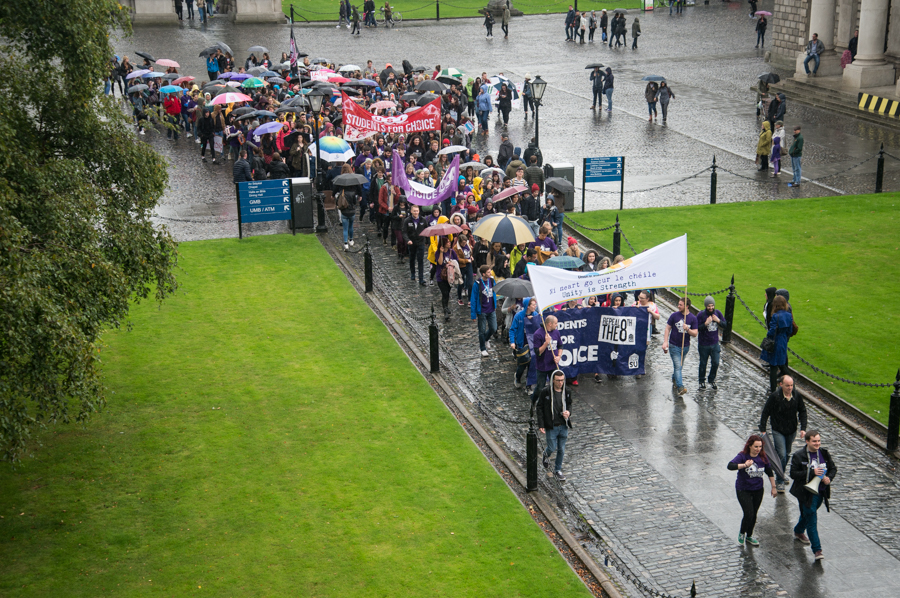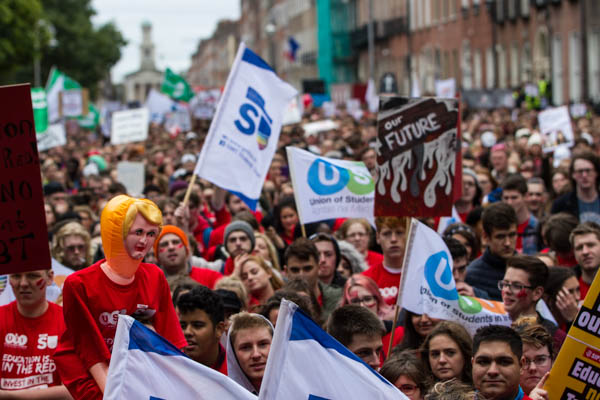Radical activism is not something the students of Ireland have ever shied away from. But have our recent efforts proved underwhelming in comparison to the progressive success of the past?
Student activism has always been at the forefront of what a students’ union represents, the culmination of strong beliefs and people coming together to try and make change in society.
We are no stranger to scenes of mass demonstration, occupations and rallying shown on Reeling In The Years. According to Trinity College Student’s Union (TCDSU) President Kevin Keane, “student activism is an interesting beast”. A beast, a brute force for student rights, aligned with the aspirations of student activism. But has this beast been tamed in recent years?
Speaking to The University Times, former Trinity Student’s Union President Ian Wilson, colourfully describes his involvement with various campaigns during the 1970s. It is clear from his infectious excitement he tells his stories with, just how electric student activism was in the past. “A level of lobbying and sophistication was necessary, but primarily we were activists”, explains Wilson. When I ask what he thinks of current lobbying engagement encouraged by TCDSU President Kevin Keane, Wilson is diplomatic: “We lobbied as well, but we were very confrontational and provocative.”
We lobbied as well, but we were very confrontational and provocative
The relationship between student politics and national politics during the 1970s was a clear indication of how fierce students had to be in the battle to be liberal in a conservative Ireland. There was an undercurrent of dissatisfaction with the government, nationally and internationally. Against a politicised backdrop, Wilson secured his position as the first TCDSU President in 1977.
Wilson informs me of the heavy influence right-wing politics had within Trinity, and the fight himself and other liberal students undertook to stop the disaffiliation of the college from the Union of Students in Ireland (USI): “The one left-leaning officer of the four and myself teamed up. We found a room that the students’ union weren’t using and set up our own offices. So we had the right-wing side not realising we had a room around the corner campaigning to stay in USI. We called it CAD, the Campaign Against Affiliation, with the slogan, ‘Don’t be mad, be a CAD’. It worked. We got ourselves very organised and we went for them.”
Wilson also notes that he paid a visit to Eamonn Gilmore, the former head of the Labour Party, and USI. “We came to an arrangement where they would support us, but they would keep the fuck out of our way”, says Wilson. “I want certainty you won’t set foot in Trinity.”
During his presidency, he published a Student Guide, which gave information on social issues such as contraception. Wilson began to provide contraception in exchange for donations. “The story there of course is we had to keep the money separate for legal reasons. We kept it in the Johnny Cash Box”, explains Wilson. “This was absolutely against the law.” The bold nature of Wilson is a clear indicator of the nature of student activism at the time. They were fearless.
Despite this boldness, Wilson maintains that the college had huge respect for student protests: “Who was going to stop us? I don’t know what people are afraid of. The college authorities are respectful in general of a student’s right to protest.”

Students join the March for Choice in 2016, led by the Union of Students in Ireland.
Now, he is unsure whether students would take the same risks as they used to: “I don’t think they would take the chance anymore. We would plan ahead, we would say ‘Come on, come on, close us down, stop us’.” He recounts a different Ireland, a “backwards” Ireland where issues were easier: “Ireland was in the period of burning witches. It was so primitive. When we formed Gay Soc, I was president that year. The first gay society was formed and they asked me to be an honourable president because they wanted a level of protection and credibility among the students. It was a level of profile and acceptability. We were real outliers remember, in moral and political terms.”
This momentum carried through into the 1980s, bringing a shift in tactics. While continuing to be well-planned and well-executed, students lost interest in the suggested methods of lobbying and became impatient with USI.
Students began targeting events outside college walls throughout the country. Rallies, demonstrations and infamous occupations became a medium of activism once again. A group of students even set a model of an immigration ship on fire, seeking attention from politicians in relation to the mass unemployment forcing students to leave Ireland in the late 1980s.
Lobbying is essentially trying to convince politicians to come onto your side and to vote the way you want them to vote.
In the last decade, we have seen the re-awakening of student activism, in tandem with the surge of young voter turnout. Speaking to The University Times, President of NUI Galway Students’ Union (NUIGSU) Lorcan O’Maoileannaigh refers to the “seismic change in Galway” in relation to student involvement in politics and activism.
As a young college, he says his union has the potential to make national noise. I ask O’Maoileannaigh what his current position is in terms of involvement in the student movement and he tells me, “I suppose there is a time and place for everything. You could be screaming and shouting ’til your lungs give out but considering the Union of Students in Ireland has a seat a very high tables, and speaking from NUI Galway’s perspective, I would sit on the governing body and the academic council. That’s where we can easily get our message across and that’s the first point of contact”.
A seat at the table, it seems, has traded places with occupations and strikes. The legislative, formal process is now an area students are more comfortable with. It seems as though students’ unions across Ireland see a greater potential for success through co-operating with politicians.
The first ever student-run lobbying group was set up by TCDSU in 2016, giving students the opportunity to be involved directly with politicians. Alongside former TCDSU President Kieran McNulty, current President Kevin Keane co-chaired this group. Keane explains that “lobbying is essentially trying to convince politicians to come onto your side and to vote the way you want them to vote and everything we do is in a sense lobbying”.
Is this as effective as it could be? Wilson draws a distinction between the student activists today and previously: “The wave of people from my time has washed through the political parties. I’m not sure if the generation coming after are radical or politicians. The student politicians are not as influential as they used to be. A huge number of them at the top would have been involved in student politics, and that is not true anymore. The link between student politics and national politics has broken down, it used to be very strong.”
Is student involvement in politics and activism still is as alive today as it was 50 years ago? It is certainly present, but has merely been tamed by the language of lobbying. But had it not been for the radicals who put student issues on the table, lobbying would not be an option.
Wilson thinks the relationship has been lost, but perhaps there just exists a new relationship, one of mutual respect and cooperation, which eliminates the need that there once was to be wild and radical. Perhaps lobbying is the result students in the 1970s and 1980s wished for? As Wilson puts it, “times are different”.
“What worked for us wouldn’t necessarily work these days. People could learn from this. I’m of the opinion there is very little new and to not be afraid to learn from what people have done before. Don’t for a second think you invented everything and that everything has to be brand new. Use what people did before and adopt it to every situation.”
Everything might be tamer today, but nevertheless the hunger for change is still there, and students are a force that will most likely remain for decades to come.







